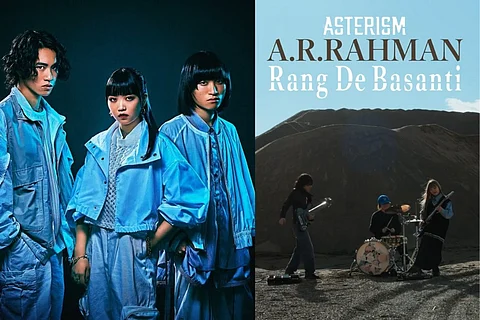
- HOMEGROWN WORLD
- #HGCREATORS
- #HGEXPLORE
- #HGVOICES
- #HGSHOP
- CAREERS
- ABOUT US
- CONTACT US

19 years since its release, 'Rang De Basanti' is a certified Bollywood classic. While the film achieved acclaim for its continually relevant, revolutionary social message and moving performances, its soundtrack also plays a large role in Rang De Basanti’s lasting cultural power. Composed by the legendary A. R. Rahman, Indian ears everywhere perk up when we hear the title track’s iconic opening notes.
When I came across a video of this same tune, this time blaring out from a Japanese woman’s electric guitar, it felt like a melding of two worlds. As someone whose brother had been a heavy metal drummer all her childhood, this rendition of A. R. Rahman’s work felt like a perfect blend of my multi-faceted cultural identities. Clearly, this short cover of 'Rang De Basanti' by the band Asterism resonated with other views as well, amassing over 760,000 views and 74,000 likes since its release in early February.
Asterism is a Japanese heavy metal band consisting of three members, Mio on the drums, Miyu on a unique 7-string bass, and Hal-ca on the guitar. Brothers Mio and Miyu were introduced to Hal-ca at a musical competition in 2014 and subsequently, formed Asterism. The group came together when Hal-ca and Miyu were just twelve years old, followed closely by Mio who was only fifteen. Now, over a decade later, Asterism is still touring the world together. Asterism has declared that they aim to create music in a new genre they call ‘mass metal’. On their website, they define mass metal as “a metal that reaches, resonates, and is loved by the masses,” as they hope to expand past their niche Japanese audience and attract people from across the globe.
Their cover of Rang De Basanti does just this. Their comments section is overflowing with praise from Indians who love their rendition of a Bollywood classic. This is nothing new for us; Indians love to embrace foreigners who embrace our culture right back. Some comments accurately point out that Asterism’s cover is getting more love than homegrown metal acts, however, two things can be true at once; we can appreciate how global cultures and genres come together as one while also showing love to the talent we have here at home. After all, the original Rang De Basanti title track is multicultural too: a Punjabi-inspired song composed by a Tamil musician.
If you like what Asterism’s doing, homegrown bands like Bloodywood, Skyharbour, Gutslit, and Inner Sanctum, may also be your cup of tea!
This isn’t Asterism’s first time experimenting with Indian music. During a recent stint in India, the Japanese trio collaborated with Bangalore-based band Pineapple Express to make ‘Metal Gandhara’. The two groups bring elements of Japanese rock, progressive fusion, heavy metal, and even Indian folk music, together in an epic, if somewhat difficult to describe, genre-bending banger. The crossover of their respective cultural influences combine with both groups’ willingness to experiment to show us the future of not just Indian, but global, music.
The beauty of reimagination is that our classics will always still be there for us to look back on. Asterism’s music shows us that there’s a lot of art for us to be excited about in our increasingly globalised world.
